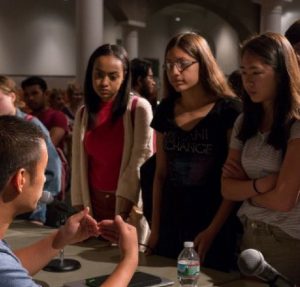On Saturday, March 25, Rise Against Hunger attended the Universities Fighting World Hunger Summit at Walsh University in Canton, Ohio, to present this year’s Clinton Hunger Leadership Award to Jonathan Chin of New York University. In this post, Jonathan shares about his ongoing contributions to the fight to end hunger.
Last summer, I had the honor of teaching 25 high school students through Cooper Union’s summer STEM program. My co-teacher, TAs and I brought the students from having almost zero coding knowledge to having working prototypes and business pitches in just six weeks. It was hectic, emotionally draining and completely worth it.

Our students reignited something latent inside of me. When I was an undergrad, I had to make a tough decision: major in English or in computer science. I juggled a double major for as long as I could but eventually dropped computer science because I worried I’d spend more time with motherboards than with people. I became an English teacher instead and only continued coding as a freelancer.
I had never taught computer science on such a large scale before, but working so closely with so many students helped me realize that this dichotomy doesn’t have to exist. We can include human-centered design in our software; we can tackle social crises with algorithms and functions. I had already been tackling hunger with the Share Meals website and app for two years; the new revelation was that socially responsible code could combat more than just food insecurity.
Imagine if social ventures had the same talent that Google, Amazon and Lyft have. In traditional business, tech has proven an unparalleled game changer. That same summer, I volunteered with a national nonprofit; I wanted to apply machine learning to their existing data but they struggled with maintaining even a basic website.
My mission ever since has been to put more STEM experts in the social impact field. In the last 40 years, we’ve seen sound business practices add new fuel to social initiatives. We call it social entrepreneurship and today there are entire institutions dedicated to it. Integrating STEM is the necessary next step and it needs to happen soon to maintain our momentum.
I served as chair and mentor for the Social Impact and Sustainability track of HackNYU, a global hackathon that had over 600 participating students this year. I’m working with Cooper Union to offer a Coding for Social Good course in their summer program. I mentored at SocialHacks, founded by high school students from my alma mater.

Imagine if, 12 years ago when I was staring at a blank change-of-major form, there was someone to reassure me that my passion for the human condition and my skills for computer engineering could coexist, even flourish in their collaboration. Imagine if there were someone like that for every engineering student today who thinks they have to choose.
Being awarded the 2017 Clinton Hunger Leadership Award has given me a higher visibility, which empowers me on two fronts: I have more opportunities to speak with undergraduate and high school students. I can learn about how they’re navigating their passions and try to clear any obstacles they’re experiencing. Additionally, I can now connect with larger organizations in the space, like the World Food Programme Innovation Lab and the Hunger Solutions Institute, to learn about their technological aspirations. This award allows me to bridge both ends and bring new minds to veteran knowledge.
To find out more about the Share Meals app, which uses real-time geolocation to decrease food insecurity, visit www.sharemeals.org. To learn about the Global App Initiative, a college student group building apps for nonprofits started at my undergrad alma mater, visit www.facebook.com/GlobalAppInitiative. If you want to leverage your expertise to build a better world, talk to the people around you; ask them what their biggest obstacles are and find out how you can help.
 "
"